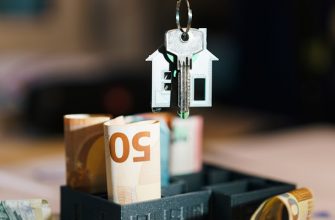- Unlocking Liquidity: How DeFi is Transforming Real Estate Investments
- Smart Contracts and Property Transactions: The Future of Buying and Selling
- Tokenization of Real Assets: Bridging the Gap Between DeFi and Real Estate
- Decentralized Ownership: Revolutionizing Property Management and Investment
- Risk and Reward: Navigating the Challenges of DeFi in Real Estate
- The Global Impact: How DeFi is Reshaping Real Estate Markets Worldwide
Unlocking Liquidity: How DeFi is Transforming Real Estate Investments
Decentralized Finance (DeFi) is revolutionizing the landscape of real estate investments by introducing innovative solutions that enhance liquidity. Traditionally, real estate has been perceived as a relatively illiquid asset class, where investors often face challenges in accessing funds quickly. However, the integration of DeFi into real estate markets is breaking down these barriers.
One of the primary advantages of DeFi is its ability to offer fractional ownership of real estate assets. This concept allows multiple investors to own a share of a property, thereby reducing the capital required to enter the market. By leveraging blockchain technology, DeFi platforms facilitate seamless transactions and secure ownership transfers, which are essential for enhancing liquidity in real estate.
- Smart contracts automate transactions, minimizing the need for intermediaries.
- Tokenization of real estate assets allows for easier trading on decentralized exchanges.
- Liquidity pools provide investors with opportunities to earn returns on idle real estate assets.
- Access to global markets expands the pool of potential investors, increasing liquidity.
Moreover, DeFi platforms often provide better transparency and security compared to traditional finance methods. By utilizing blockchain, all transactions are recorded immutably, reducing the risk of fraud and fostering trust among investors. This transparency is crucial for attracting more participants to the real estate market, further enhancing liquidity.
In conclusion, the DeFi ecosystem is transforming how real estate investments are approached. By unlocking liquidity through innovative solutions such as fractional ownership and tokenization, DeFi empowers investors to participate more freely in the real estate market. As these technologies continue to evolve, the potential for further transformation in real estate investment dynamics is significant.
Smart Contracts and Property Transactions: The Future of Buying and Selling
The integration of decentralized finance (DeFi) into real estate markets is revolutionizing traditional property transactions. One of the most significant innovations in this landscape is the use of smart contracts. Smart contracts automate and streamline the buying and selling process, offering enhanced security and transparency. By eliminating the need for intermediaries, such as brokers and notaries, these contracts reduce transaction costs and accelerate the transfer of property ownership.
Smart contracts operate on blockchain technology, ensuring that all terms of the agreement are securely recorded and immutable. This technology enables parties involved in property transactions to execute agreements without the risk of manipulation or fraud. As a result, trust is established between buyers and sellers, fostering a more efficient and reliable market.
- Efficiency: Smart contracts facilitate faster property transactions by automating processes that typically require significant time and effort.
- Cost Reduction: By minimizing the roles of intermediaries, transaction costs are significantly lowered, making real estate investment more accessible.
- Transparency: All parties can view the transaction details on the blockchain, promoting accountability and trust in property dealings.
- Security: The decentralized nature of blockchain technology protects against fraud and unauthorized changes to contracts.
The adoption of smart contracts in real estate signifies a shift towards a more decentralized approach, aligning with the broader principles of DeFi. As this technology continues to mature, it is expected that more real estate transactions will leverage smart contracts, further enhancing the efficiency of property markets. This trend will not only transform how properties are bought and sold but also attract a new wave of investors looking for innovative ways to engage with real estate.
In conclusion, the future of buying and selling properties lies in the integration of smart contracts within real estate transactions. The DeFi revolution is reshaping the landscape, providing benefits that enhance the overall experience for both buyers and sellers. With ongoing advancements in blockchain technology, the potential for smart contracts in property transactions is vast, promising a more streamlined and secure market environment.
Tokenization of Real Assets: Bridging the Gap Between DeFi and Real Estate
Tokenization of real assets represents a groundbreaking approach to merging decentralized finance (DeFi) with the real estate market. This innovative process involves converting physical properties into digital tokens on a blockchain, allowing for fractional ownership and enhanced liquidity. As a result, investors can access real estate opportunities that were previously limited to high-net-worth individuals.
The advantages of tokenization in real estate are manifold:
- Increased Liquidity: Tokenization enables real estate assets to be traded on blockchain platforms, providing liquidity that traditional real estate markets lack.
- Fractional Ownership: By breaking down properties into smaller digital tokens, more investors can participate in high-value assets.
- Transparency: Blockchain technology ensures that all transactions are recorded transparently, reducing fraud and enhancing trust among investors.
- Lower Barriers to Entry: With tokenization, the cost of entering the real estate market is significantly reduced, opening doors for a diverse range of investors.
- Global Reach: Tokenized assets can be traded globally, allowing investors from different regions to diversify their portfolios with ease.
The integration of DeFi into real estate through tokenization not only democratizes access to property investment but also streamlines various processes, such as property management and transactions. Smart contracts can automate rental agreements and facilitate secure payments, minimizing the need for intermediaries.
In conclusion, the tokenization of real assets is a pivotal advancement that bridges the gap between decentralized finance and real estate. This convergence not only transforms how investors engage with property markets but also paves the way for a more inclusive and efficient financial ecosystem.
Decentralized Ownership: Revolutionizing Property Management and Investment
Decentralized ownership is reshaping the landscape of property management and investment, significantly impacting the real estate sector. By leveraging blockchain technology and smart contracts, decentralized finance (DeFi) provides innovative solutions for property transactions. This transformation allows for greater transparency, security, and accessibility in real estate investments.
- Enhanced Transparency: Blockchain technology records all transactions in an immutable ledger, ensuring that ownership records are clear and verifiable.
- Lower Costs: Decentralized platforms reduce the need for intermediaries, such as banks and brokers, leading to decreased transaction costs for investors.
- Global Accessibility: DeFi enables investors from around the world to participate in real estate markets without the usual barriers, democratizing property investment.
- Fractional Ownership: Investors can now purchase fractions of properties, diversifying their portfolios and minimizing risk.
- Smart Contracts: Automated agreements facilitate secure and efficient transactions, reducing the potential for fraud and disputes.
Such advantages position decentralized ownership as a game-changer in the property management industry. Investors can now engage in real estate investments with greater confidence, knowing that their assets are protected by the robust security features of blockchain technology. The integration of decentralized finance into real estate is not merely a trend; it is a fundamental shift toward a more efficient, transparent, and inclusive market.
As the DeFi revolution continues to evolve, it is crucial for stakeholders in the real estate sector to adapt to these changes. Embracing decentralized ownership will not only enhance investment opportunities but also lead to innovative property management solutions. The future of real estate lies in the seamless integration of decentralized finance, paving the way for a new era of property transactions.
Risk and Reward: Navigating the Challenges of DeFi in Real Estate
The integration of decentralized finance (DeFi) into the real estate market presents a unique blend of risk and reward. As the DeFi landscape evolves, it offers innovative solutions for property transactions, yet it comes with inherent challenges that investors must navigate. Understanding these factors is crucial for anyone looking to capitalize on the DeFi revolution in real estate.
- Potential for Higher Returns: One of the primary attractions of DeFi in real estate is the potential for significant returns on investment. By leveraging blockchain technology, investors can access new financial instruments that enhance liquidity and diversify income streams.
- Access to Global Markets: DeFi platforms enable investors to participate in real estate opportunities across borders without traditional barriers. This global access opens up possibilities for increased profitability, but also introduces various regulatory and legal considerations.
- Smart Contracts and Automation: The use of smart contracts in real estate transactions can streamline processes and reduce costs. However, reliance on automated systems can lead to vulnerabilities if not properly audited and secured.
- Volatility and Market Risk: The DeFi sector is characterized by high volatility. Investors must be prepared for fluctuating asset values and market dynamics that can affect their real estate investments.
- Regulatory Uncertainty: The evolving regulatory landscape surrounding DeFi presents challenges. Investors must stay informed about changes in laws and regulations that could impact their investments in real estate.
In summary, while the integration of decentralized finance into the real estate sector offers exciting opportunities, it is essential to approach this landscape with caution. Understanding the delicate balance between risk and reward is vital for success in navigating the complexities of DeFi in real estate markets. As the sector matures, investors who are well-informed and strategically positioned will be better equipped to harness the full potential of this financial revolution.
The Global Impact: How DeFi is Reshaping Real Estate Markets Worldwide
The global landscape of real estate markets is undergoing a significant transformation due to the rise of decentralized finance (DeFi). This innovative approach empowers individuals and removes traditional barriers, enabling seamless transactions and investment opportunities in real estate. DeFi’s integration into real estate markets is fostering accessibility and liquidity, which are crucial for both investors and property owners.
- Decentralized platforms facilitate peer-to-peer transactions, eliminating the need for intermediaries such as banks and brokers.
- Smart contracts automate and secure transactions, reducing the risk of fraud and enhancing trust among parties involved.
- Tokenization of real estate assets allows for fractional ownership, making investments more affordable and diversifying portfolios.
- The global reach of DeFi opens up international markets, enabling investors to explore opportunities beyond their local jurisdictions.
Moreover, the rise of DeFi is promoting transparency in real estate transactions. With blockchain technology, all transactions are recorded and publicly accessible, ensuring accountability and reducing disputes. This transparency is particularly beneficial in the real estate market, where trust is paramount.
As DeFi continues to reshape real estate markets worldwide, it paves the way for innovative investment strategies. Investors can leverage decentralized finance to engage in new forms of funding, such as real estate crowdfunding and decentralized autonomous organizations (DAOs) dedicated to property investments. These developments are not only democratizing access to real estate but also encouraging a more sustainable and inclusive market environment.
In conclusion, the impact of DeFi on global real estate markets is profound. By enhancing accessibility, transparency, and efficiency, decentralized finance is revolutionizing how properties are bought, sold, and managed. As this trend continues to evolve, it is likely to redefine the future of real estate investment and ownership on a global scale.










I never knew that decentralized finance could revolutionize the real estate market until I read this article. It’s amazing how blockchain technology is changing the way we invest in properties. Could you explain more about how tokenization works in real estate transactions?
As someone who is new to DeFi, this article provided a clear explanation of how it is being integrated into the real estate market. I’m excited to see how this technology will democratize access to real estate investments. Can you share some examples of successful DeFi real estate projects?
I have been following the development of DeFi in real estate for some time now, and this article perfectly captures the potential of this integration. Tokenizing real estate assets can bring liquidity to illiquid markets. How do you see the future of DeFi in the real estate industry?